
1882 Birth: Hans Geiger: German physicist, will co-invent the Geiger Counter.
1883 Birth: Bernhard Rust: He will join the NSDAP in 1922 and become the provincial party boss of Hanover; Minister of science, education and popular development, 1934-1935. He will commit suicide May 8, 1945.
1914 World War I: Various:
Eastern Front: Before Grand Duke Nikolai, the Russian supreme commander, can move through Poland into Silesia, the heart of Germany's mineral resources, Hindenburg attacks their left flank.
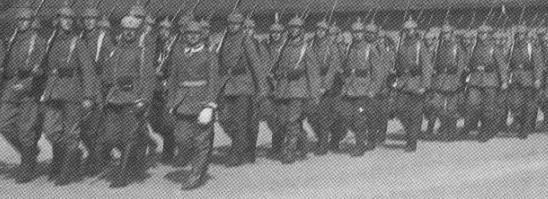
List Regiment (Sep 1-Oct 7): Infantry recruit Adolf Hitler's regiment continues a short but intensive basic training program, which is held in the premises of a large public school on the Elizabeth Platz in Munich. Hitler receives the first uniform of his life; basic greenish-grey with an "RIR 16" sown in red unto the epaulettes and a red stripe down the side of the trousers. The trousers are tucked into new leather boots, topped by a thick leather belt around the waist of the uniform jacket. [For further details, Click here.]

1915 World War I: List Regiment: Gefreiter Adolf Hitler's 16 Reserve Infantry Regiment continue to occupy a position, at Fromelles—pictured above in a drawing by Hitler—on a level field with water channels, willow trees and willow stalks; in the distance towards the enemy lines lies an insignificant wood with barbed wire entanglements. Under the direction of their defense-minded commander, Lieutenant General Gustav Scanzoni von Lichtenfels, the regiment works ceaselessly day and night to further fortify their position at Fromelles while fighting off repeated assaults by the enemy. [For further details, Click here.]
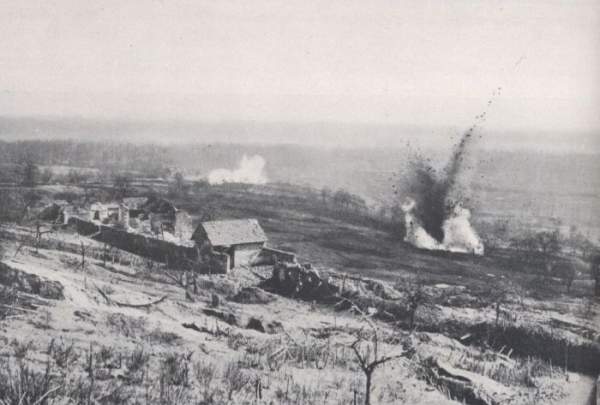
1916 World War I: List Regiment Sep 27-Oct 2: Gefreiter Adolf Hitler's 16th RIR assist in building trenches and fortified works, just east of Bapaume in the Somme. [For further details, Click here.]
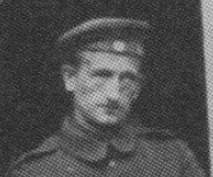
1917 World War I (Sep 30-Oct 17): Hitler takes an eighteen-day furlough to accompany Schmidt [above] on a visit to his sister in Dresden with him. After sightseeing stops at Brussels and Cologne, they hit Leipzig, a city Hitler especially enjoys. He is impressed by the 300-foot tall monument, Battle of the Nations, honoring the war-dead of 1812. "This has nothing to do with art," he tells Schmidt (above), "but it is enormous and beautiful." After spending some time with Schmidt in Dresden, Hitler goes off by himself to Berlin to spend a few days with yet another front-line comrade. In a postcard to Schmidt, he writes: "The city is marvelous. A real world capital. Traffic is still tremendous. Am gone almost all day. Now finally have opportunity to study the museums a little better. In short: there is nothing lacking." [For further details, Click here.]
1918 World War I: Various
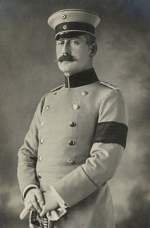
Prince Max von Baden is named head of the new German government.
Allied Offensive around Ypres:
After smashing through the Hindenburg Line east of the old battlegrounds of the Somme, the Allies turn their attention northward where Hitler and his regiment are stationed. Because of the growth of American forces in France, a French army is moved north to join the British for a combined attack against the Germans around Ypres again. On September 29, the Allies open up with a barrage of high explosives shells intermingled with mustard gas. Short of troops, Ludendorff has been forced to take men from one part of his line to protect another and there were now only five divisions left to defend the area. The Germans have no choice but to fall back. After a few days of fighting along a twenty-mile front, the Germans are forced back in some places eight miles and another 10,000 prisoners are taken along with scores of heavy guns. The Allied soldiers advance steadily but this time their most difficult opposition is the rain. It rains nearly as hard as it had during the Third Battle of Ypres the year before. The troops move across an eerie, fog-shrouded wasteland. "I remember well," Hitler would say, "that we had some very hard fighting [in] October 1918, and then . . . came the rain, and everything was washed out.
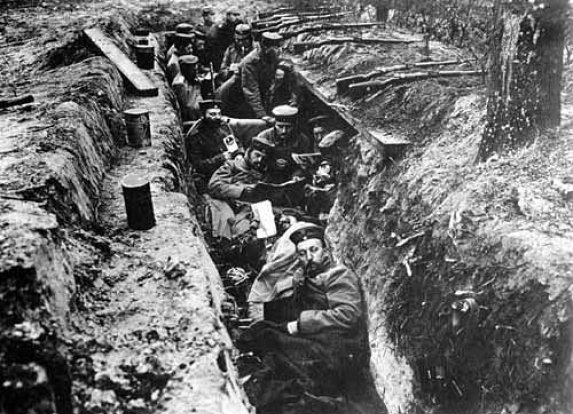
List Regiment (Sep 28-Oct 15): Gefreiter Adolf Hitler participates in defensive operations in Flanders with 3 Company, 16 Bavarian Reserve Infantry Regiment. [For further details, Click here.]
Turks abandon Damascus as Allies approach:

On the night of September 30, 1918, as Allied forces led by General Edmund Allenby march steadily toward Damascus, Turkish authorities abandon the city. [For further details, click here]
President Woodrow Wilson speaks in favor of female suffrage:

Suffragists and their supporters agreed that Wilson had a debt to pay to the country's women, who at the time were asked to support their sons and husbands fighting overseas in the First World War and who were contributing to the war effort on the home front. In his September 30 speech to Congress, Wilson acknowledged this debt, saying "we have made partners of the women in this war...Shall we admit them only to a partnership of suffering and sacrifice and toil and not to a partnership of privilege and right?" [For further details, click here]
1923 Weimar: Hitler visits the Wagner family and Houston Stewart Chamberlain at Wagner's home in Bayreuth. When he returns to Munich, he finds a letter from Chamberlain praising him as a Messiah and comparing Chamberlain himself with John the Baptist. "At one blow you have transformed the state of my soul," Chamberlain writes. "That Germany in her hour of need has produced a Hitler testifies to its vitality. Now at last I am able to sleep peacefully and I shall have no need to wake up again. God protect you!" (THP)
1928 Birth: Elie Wiesel: Romanian Holocaust survivor, writer and Nazi-hunter; will be best known for his first book Night about his own experiences in concentration camps, and Souls on Fire, Nobel prizewinner 1986.
1929 The first manned rocket plane flight is undertaken by German auto maker Fritz von Opel, who apparently put rockets on anything that moved.
1933 Holocaust: One hundred fifty-five Jewish traders are ousted from the Berlin Stock Exchange.
1935 Holocaust: All Jewish civil servants in Germany are placed on leave. (THP)
1938 Various:
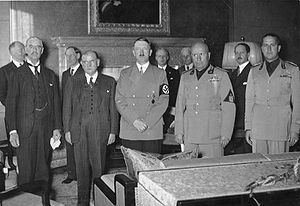
Munich Conference: The Munich Agreement is signed by Chamberlain, Hitler, Daladier and Mussolini. The Czechoslovakian Sudetenland is ceded to Germany. Czechoslovakia reluctantly bows to the circumstances and accepts the Munich Agreement. After returning to England, Chamberlain declares, "I believe it is peace for our time." Note: In the House of Commons the Munich Agreement is denounced by Winston Churchill as "a total and unmitigated defeat."
The League of Nations unanimously outlaws 'intentional bombings of civilian populations.'
1939 World War II: Various:
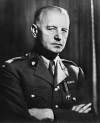
General Władysław Sikorski becomes Prime Minister of the Polish government-in-exile. [For further information, click here]
Operation Saar: General Gamelin issues orders for the token French army, engaged in Operation Saar, to begin withdrawing from Germany during the night. The attack had only penetrated five miles into Germany; a halfhearted attempt to relieve pressure on the Poles without actually running much risk of actual combat. (THP) Church and Reich: The German Minister of Ecclesiastical Affairs, Hanns Kerrl sends word to all church authorities suggesting that all church bells should ring during the noon hour for seven days "out of grateful commemoration of the victory (over Poland) and of the dead. (THP)
Holocaust: About 400,000 of the 600,000 people classified as Jews in Germany have already fled the country. Of the 200,000 who remain, about 150,000 will die in the concentration camps. (THP)
1941 World War II: Karl Doenitz: From general orders—better known in France under the name of "hostages code"—which repeats and specifies in detail the previous order, namely that of 23 August 1941:
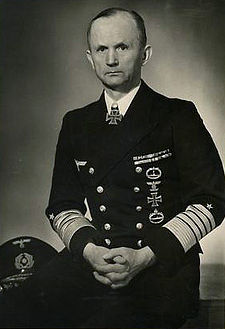
On the morning of 21 August 1941, a member of the German Armed Forces was killed in Paris as a result of a murderous attack. I therefore order that:
I. All Frenchmen held in custody of whatever kind, by the German authorities or on behalf of German authorities in France, are to be considered as hostages as from 23 August. If any further incident occurs, a number of these hostages are to, be shot, to be determined according to the gravity of the attempt.
2. On 19 September 1941 by an announcement to the Plenipotentiary of the French Government attached to the Military Commander in France, I ordered that, as from 19 September 1941, all French males who are under arrest of any kind by the French authorities or who are taken into custody because of Communist or anarchistic agitation are to be kept under arrest by the French authorities also on behalf of the Military Commander in France.
3. On the basis of my notification of the 22d of August 1941 and of my order of the 19th of September 1941 the following groups of persons are therefore hostages:
(a) All Frenchmen who are kept in detention of any kind whatsoever by the German authorities, such as police custody, imprisonment on remand, or penal detention.
(b) All Frenchmen who are kept in detention of any kind whatsoever by the French authority on behalf of the German, authorities. This group includes: (aa) All Frenchmen who are kept in detention of any kind whatsoever by the French authorities because of Communist or anarchist activities.
(bb) All Frenchmen on whom the French penal authorities impose prison terms at the request of the German military courts and which the latter consider justified.
(cc) All Frenchmen who are arrested and kept in custody by the French authorities upon demand of the German authorities or who are being handed over by the Germans to French authorities with the order to keep them under arrest.
(c) Stateless inhabitants who have already been living for some time in France are to be considered as Frenchmen within the meaning of my notification of the 22d of August 1941'.
III. Release from detention. Persons who were not yet in custody on 22 August 1941 or on 19 September 1941 but who were arrested later or are still being arrested are hostages as from the date of detention if the other conditions apply to them. The release of arrested persons authorized on account of expiration of sentences, lifting of the order for arrest, or for other reasons will not be affected by my announcement of 22 August 1941. Those released are no longer hostages. In as far as persons are in custody of any kind with the French authorities for Communist or anarchist activity, their release is possible only with my approval as I have informed the French Government....
VI. Lists of hostages. If an incident occurs which according to my announcement of 22 August 1941 necessitates the shooting of hostages, the execution must immediately follow the order. The district commanders, therefore, must select for their own districts from the total number of prisoners (hostages) those who, from a practical point of view, may be considered for execution and enter them on a list of hostages. These lists of hostages serve as a basis for the proposals to be submitted to me in the case of an execution.
I. According to the observations made so far, the perpetrators of outrages originate from Communist or anarchist terror gangs. The district commanders are, therefore, to select from those in detention (hostages), those persons who, because of their Communist or anarchist views in the past or their positions in such organizations or their former attitude in other ways, are most suitable for execution. In making the selection it should be borne in mind that the better known the hostages to be shot, the greater will be the deterrent effect on the perpetrators, themselves, and on those persons who, in France or abroad, bear the moral responsibility--as instigators or by their propaganda-for acts of terror and sabotage. Experience shows that the instigators and the political circles interested in these plots are not concerned about the life of obscure followers, but are more likely to be concerned about the lives of their own former officials. Consequently, we must place at the head of these lists:
(a) Former deputies and officials of Communist or anarchist organizations.
(b) Persons (intellectuals) who have supported the spreading of Communist ideas by word of mouth or writing.
(c) Persons who have proved by their attitude that they are particularly dangerous.
(d) Persons who have collaborated in the distribution of leaflets . . . .
2. Following the same directives, a list of hostages is to be prepared from the prisoners with De Gaullist sympathies.
3. Racial Germans of French nationality who are imprisoned for Communist or anarchist activity may be included in the list. Special attention must be drawn to their German origin on the attached form. Persons who have been condemned to death but who have been pardoned may also be included in the lists . . . .
5. The lists have to record for each district about 150 persons and for the Greater Paris Command about 300 to 400 people. The district chiefs should always record on their lists those persons who had their last residence or permanent domicile in their districts, because the persons to be executed should, as far as possible, be taken from the district where the act was committed . . . . "The lists are to be kept up to date. Particular attention is to be paid to new arrests and releases.'
VII. Proposals for executions: In case of an incident which necessitates the shooting of hostages, within the meaning of my announcement of 22 August 1941, the district chief in whose territory the incident happened is to select from the list of hostages persons whose execution he wishes to propose to me. In making the selection he must, from the personal as well as local point of view, draw from persons belonging to a circle which presumably includes the guilty...For execution, only those persons who were already under arrest at the time of the crime may be proposed. The proposal must contain the names and number of the persons proposed for execution, that is, in the order in which the choice is recommended . . . .
When the bodies are buried, the burial of a large number in a common grave in the same cemetery is to be avoided, in order not to create places of pilgrimage which, now or later, might form centers for anti-German propaganda. Therefore, if necessary, burials must be carried out in various places.
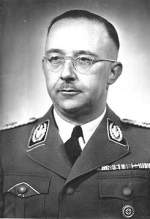
Holocaust: Himmler sets out on a tour of the conquered areas of southern Russia: He takes with him Dr. Albert Widmann, head of the chemical section of the RSHA Criminal Technical Institute and one of the prime inventors of the new gas truck that recycled its own exhaust. Since it was easier to modify existing trucks in the field to serve as mobile gas chambers than to produce new trucks in Germany and then transport them to the East, Widmann went along as a technical consultant. (THP)
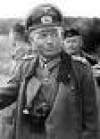
Guderian
Barbarossa: Guderian's and Hoth's panzers rejoin Army Group Center, and the advance on Moscow is resumed. The Germans now face a rejuvenated enemy that has profited from the respite Hitler has given them to construct strong defenses and move large numbers of troops to defend the capital. (THP)
Armored forces of Heeresgruppe Mitte launch an attack to capture Orel.
From the Diary of Rear Admiral Giichi Nakahara:
Italian air force attacked a British convoy consisting of a battleship, a carrier, some cruisers and destroyers with the result of sinking several cruisers by torpedoes. This is pretty big news in recent times. There is a report that German troops have neared Kharkov. German submarines and patrol boats have sunk 88 British vessels during the past week. Moscow talk has begun; England, the US and Soviet. The (US) Neutrality Act seems to be modified. (Dillon)
[See: Countdown to Infamy: Timeline to Pearl Harbor.]1942 World War II: Various:
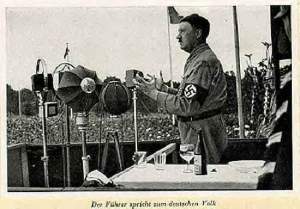
Hitler speaks in Berlin:
I myself very much regret not being able to stand oftener before the nation. I am naturally afraid that my speeches thereby are becoming worse rather than better, for in this regard practice is necessary. My time is unfortunately much more limited than the time of my worthy adversaries. Naturally he who can travel around the world for weeks at a time, with a broad sombrero on his head, wearing a white silk shirt here, and some other outfit there, can naturally occupy himself much more with speeches.
Report found in the Rosenberg files:
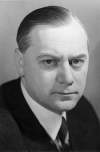
How necessary this interference was is shown by the fact that this train with returning laborers had stopped at the same place where a train with newly recruited Eastern Workers had stopped. Because of the corpses in the trainload of returning laborers, a catastrophe might have been precipitated had it not been for the mediation of Mrs. Miller. In this train women gave birth to babies who were thrown out of the windows during the journey, people having tuberculosis and venereal diseases rode in the same car, dying people lay in freight cars without straw, and one of the dead was thrown on the railway embankment. The same must have occurred in other returning transports.
1943 Holocaust: A work unit of 325 Jews and Soviet prisoners, who were being forced, in chains, to dig up burn victims of the massacre at Babi Yar, near Kiev, revolt when they too are about to be killed. 14 survive the revolt. (THP)
1944 World War II: Various:
France: Calais is re-occupied by the Allies.
Stalin to Churchill:

I share your conviction that firm agreement between the three leading powers constitutes a true guarantee of future peace and answers to the best hopes of all peace-loving peoples. The continuation of our governments in such a policy in the postwar period as we have achieved during this great war will, it seems to me, have a decisive influence. Of course, I have a great desire to meet with you and the President. I attach great importance to it from the point of view of the interests in our common business. But, as far as I am concerned, I must make one reservation. The doctors advise me not to undertake long journeys. For a certain period I must take account of this. I warmly welcome your wish to come to Moscow in October. We shall have to consider military and other questions, which are of great importance . . . . As regards Japan, our position is the same as it was at Teheran.
From the Summary Report of the US Strategic Bombing Survey:
The jet planes, especially the ME-262, were the most modern planes which any belligerent had in general operation at the end of the war. According to manufacturers and other competent observers, their production was delayed because of the failure of the Luftwaffe to recognize in time the advantages of the type. It was also delayed because Hitler intervened in 1944 with an ill-timed order to convert the ME-262 to a fighter-bomber. Virtually every manufacturer, production official, and air force general interrogated by the Survey, including Goering himself, claimed to have been appalled by this order. By May 1945, 1,400 jets had been produced. Had these planes been available six months earlier with good quality pilots, though they might not have altered the course of the war, they would have sharply increased the losses of the attacking forces . . . .
Among the most significant of the other factors which contributed to the success of the air effort was the extraordinary progress during the war of Allied research, development, and production. As a result of this progress, the air forces eventually brought to the attack superiority in both numbers and quality of crews, aircraft, and equipment. Constant and unending effort was required, however, to overcome the initial advantages of the enemy and later to keep pace with his research and technology. It was fortunate that the leaders of the German Air Force relied too heavily on their initial advantage. For this reason they failed to develop, in time, weapons, such as their jet-propelled planes, that might have substantially improved their position. There was hazard, on the other hand, in the fact that the Allies were behind the Germans in the development of jet propelled aircraft. The German development of the V weapons, especially the V-2, is also noteworthy.
Speed, range, and striking power of the air weapons of the future, as indicated by the signposts of the war in Europe must—specifically—be reckoned with in any plans for increased security and strength. The combination of the atomic bomb with remote-control projectiles of ocean-spanning range stands as a possibility which is awesome and frightful to contemplate.
1946 Nuremberg Tribunal: Final Judgments are read in open court:
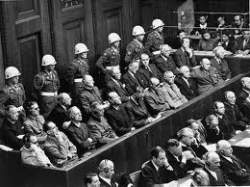
Goering is indicted on all four Counts. The evidence shows that after Hitler he was the most prominent man in the Nazi regime. He was Commander-in-Chief of the Luftwaffe, Plenipotentiary for the Four Year Plan, and had tremendous influence with Hitler, at least until 1943, when their relationship deteriorated, ending in his arrest in 1945. He testified that Hitler kept him informed of all important military and political problems. [For the full text of today's proceedings, Click here.]
1949 Cold War: Berlin Airlift ends:
After 15 months and more than 250,000 flights, the Berlin Airlift officially comes to an end. The airlift was one of the greatest logistical feats in modern history and was one of the crucial events of the early Cold War.
In June 1948, the Soviet Union suddenly blocked all ground traffic into West Berlin, which was located entirely within the Russian zone of occupation in Germany. It was an obvious effort to force the United States, Great Britain, and France (the other occupying powers in Germany) to accept Soviet demands concerning the postwar fate of Germany. As a result of the Soviet blockade, the people of West Berlin were left without food, clothing, or medical supplies. Some U.S. officials pushed for an aggressive response to the Soviet provocation, but cooler heads prevailed and a plan for an airlift of supplies to West Berlin was developed. It was a daunting task: supplying the daily wants and needs of so many civilians would require tons of food and other goods each and every day. On June 26, 1948, the Berlin Airlift began with U.S. pilots and planes carrying the lion's share of the burden. During the next 15 months, 277,264 aircraft landed in West Berlin bringing over 2 million tons of supplies. On September 30, 1949, the last plane--an American C-54--landed in Berlin and unloaded over two tons of coal. Even though the Soviet blockade officially ended in May 1949, it took several more months for the West Berlin economy to recover and the necessary stockpiles of food, medicine, and fuel to be replenished.
The Berlin Airlift was a tremendous Cold War victory for the United States. Without firing a shot, the Americans foiled the Soviet plan to hold West Berlin hostage, while simultaneously demonstrating to the world the "Yankee ingenuity" for which their nation was famous. For the Soviets, the Berlin crisis was an unmitigated disaster. The United States, France, and Great Britain merely hardened their resolve on issues related to Germany, and the world came to see the Russians as international bullies, trying to starve innocent citizens. (History.com)
1954 USS Nautilus commissioned: The USS Nautilus, the world's first nuclear submarine, is commissioned by the U.S. Navy. [For further details, click here]
1956 Spandau Prison: From Spandau: The Secret Diaries, by Albert Speer:
Having completed his 10-year sentence, Karl Doenitz is released from Spandau one day early.
1997 Holocaust: France's Roman Catholic Church apologizes for its silence during the systematic persecution and deportation of Jews by the pro-Nazi Vichy regime. (AP)
1999 Radiation released at Japanese plant:
Large doses of radiation are released at Japan's Tokaimura nuclear plant on this day in 1999. It was Japan's worst nuclear accident, caused by a serious error made by workers at the plant. One person was killed, 49 were injured and thousands of others were forcibly confined to their homes for several days. [For further details, click here]
Edited by Levi Bookin (Copy editor)
levi.bookin@gmail.com



Click to join 3rdReichStudies



Disclaimer: This site includes diverse and controversial materials--such as excerpts from the writings of racists and anti-Semites--so that its readers can learn the nature and extent of hate and anti-Semitic discourse. It is our sincere belief that only the informed citizen can prevail over the ignorance of Racialist "thought." Far from approving these writings, this site condemns racism in all of its forms and manifestations.
Fair Use Notice: This site may contain copyrighted material the use of which has not always been specifically authorized by the copyright owner. We are making such material available in our efforts to advance understanding of historical, political, human rights, economic, democracy, scientific, environmental, and social justice issues, etc. We believe this constitutes a "fair use" of any such copyrighted material as provided for in section 107 of the US Copyright Law. In accordance with Title 17 U.S.C. Section 107, the material on this site is distributed without profit to those who have expressed a prior interest in receiving the included information for research and educational purposes. If you wish to use copyrighted material from this site for purposes of your own that go beyond 'fair use', you must obtain permission from the copyright owner.
Please Note: The list-owner and moderators of 3rdReichStudies are not responsible for, and do not necessarily approve of, the random ads placed on our pages by our web server. They are, unfortunately, the price one pays for a 'free' website.